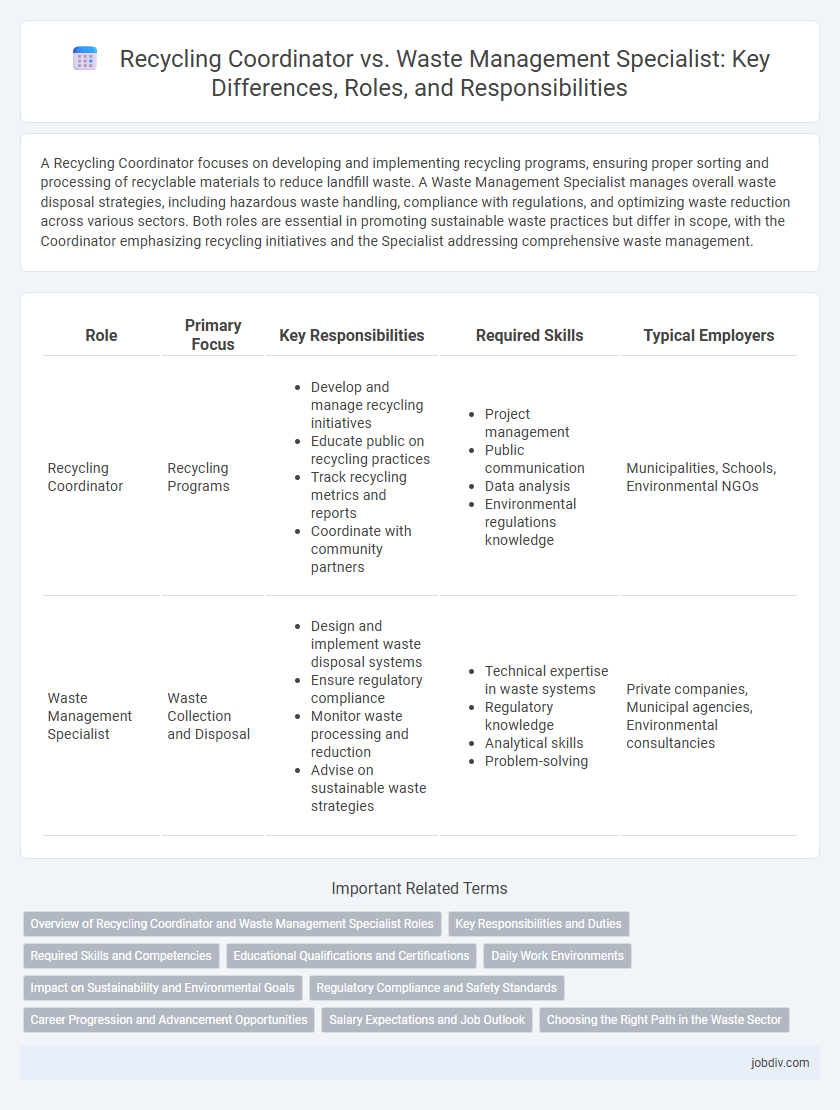A Recycling Coordinator focuses on developing and implementing recycling programs, ensuring proper sorting and processing of recyclable materials to reduce landfill waste. A Waste Management Specialist manages overall waste disposal strategies, including hazardous waste handling, compliance with regulations, and optimizing waste reduction across various sectors. Both roles are essential in promoting sustainable waste practices but differ in scope, with the Coordinator emphasizing recycling initiatives and the Specialist addressing comprehensive waste management.
Table of Comparison
| Role | Primary Focus | Key Responsibilities | Required Skills | Typical Employers |
|---|---|---|---|---|
| Recycling Coordinator | Recycling Programs |
|
|
Municipalities, Schools, Environmental NGOs |
| Waste Management Specialist | Waste Collection and Disposal |
|
|
Private companies, Municipal agencies, Environmental consultancies |
Overview of Recycling Coordinator and Waste Management Specialist Roles
Recycling Coordinators specialize in developing and implementing programs to increase materials recovery and reduce landfill waste, focusing on community engagement and education. Waste Management Specialists analyze and optimize waste collection, disposal, and treatment processes to ensure regulatory compliance and operational efficiency across residential, commercial, and industrial sectors. Both roles contribute to sustainable waste reduction but differ in scope, with Recycling Coordinators emphasizing behavioral change and Waste Management Specialists focusing on system management.
Key Responsibilities and Duties
Recycling Coordinators focus on developing and implementing recycling programs, coordinating community outreach, and ensuring compliance with local recycling regulations. Waste Management Specialists analyze waste collection processes, optimize landfill operations, and develop strategies to reduce overall waste generation through efficient disposal and resource recovery. Both roles require expertise in environmental policies, but Recycling Coordinators emphasize public engagement while Waste Management Specialists prioritize technical waste handling and regulatory compliance.
Required Skills and Competencies
A Recycling Coordinator must possess strong organizational skills, knowledge of local recycling laws, and effective communication abilities to engage communities and manage recycling programs. Waste Management Specialists require expertise in environmental regulations, data analysis, and operational logistics to develop and implement waste reduction strategies efficiently. Both roles demand proficiency in sustainability practices, problem-solving skills, and the ability to coordinate with multiple stakeholders for successful waste diversion.
Educational Qualifications and Certifications
A Recycling Coordinator typically holds a bachelor's degree in environmental science, sustainability, or a related field, often accompanied by certifications such as the Certified Recycling Professional (CRP) credential. In contrast, a Waste Management Specialist usually requires a broader educational background, including degrees in environmental engineering or public administration, with certifications like the Registered Waste Manager (RWM) or Hazardous Waste Operations and Emergency Response (HAZWOPER). Both roles emphasize expertise in regulatory compliance and sustainability practices, but their certifications reflect specialized knowledge in recycling programs versus comprehensive waste management systems.
Daily Work Environments
Recycling Coordinators typically operate in community centers, municipal offices, or educational institutions, focusing on organizing recycling programs, conducting public outreach, and monitoring local recycling efforts. Waste Management Specialists often work on-site at landfills, waste treatment facilities, or large industrial complexes, overseeing waste collection processes, ensuring compliance with environmental regulations, and managing hazardous waste disposal. Both roles require collaboration with government agencies and private contractors to optimize waste reduction and promote sustainable practices.
Impact on Sustainability and Environmental Goals
A Recycling Coordinator primarily drives sustainability by overseeing programs that maximize material recovery and reduce landfill waste, directly supporting circular economy objectives. Waste Management Specialists analyze waste streams and implement efficient disposal methods, minimizing environmental pollution and resource depletion. Both roles are crucial for achieving environmental goals, but Recycling Coordinators focus more on prevention and reuse, while Waste Management Specialists emphasize waste treatment and regulatory compliance.
Regulatory Compliance and Safety Standards
A Recycling Coordinator ensures adherence to local and federal recycling regulations by developing compliant waste diversion programs and conducting regular audits. In contrast, a Waste Management Specialist focuses on broader regulatory compliance, including hazardous waste handling and environmental safety standards established by agencies such as the EPA and OSHA. Both roles require thorough knowledge of safety protocols to mitigate risks and maintain environmental sustainability in waste operations.
Career Progression and Advancement Opportunities
Recycling Coordinators typically focus on program development and community engagement, gaining expertise in waste reduction strategies and sustainable practices. Waste Management Specialists often advance by leveraging technical knowledge in regulatory compliance, hazardous waste handling, and operational efficiency, positioning themselves for leadership roles within environmental consulting firms or municipal agencies. Career progression from Recycling Coordinator to Waste Management Specialist is common as professionals acquire broader skills in waste stream analysis and policy implementation, enhancing their qualifications for senior environmental management positions.
Salary Expectations and Job Outlook
Recycling Coordinators typically earn an average salary ranging from $45,000 to $65,000 annually, focusing on organizing community recycling initiatives. Waste Management Specialists command higher salaries, averaging between $55,000 and $80,000, due to their roles in overseeing comprehensive waste disposal strategies and regulatory compliance. Job outlook for both positions is positive, with a projected growth rate of 5-7% over the next decade, driven by increasing environmental regulations and sustainability efforts.
Choosing the Right Path in the Waste Sector
A Recycling Coordinator specializes in developing and managing programs that promote material recovery and reduce landfill use, emphasizing community engagement and regulatory compliance. A Waste Management Specialist focuses on planning, implementing, and overseeing comprehensive waste disposal and treatment processes, including hazardous waste handling and sustainability initiatives. Selecting the right path depends on whether your interest lies in program coordination and public outreach or in technical waste treatment and environmental compliance within the waste sector.
Recycling Coordinator vs Waste Management Specialist Infographic

 jobdiv.com
jobdiv.com